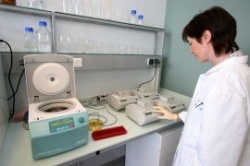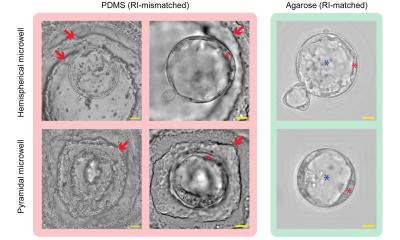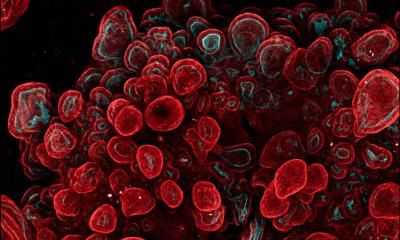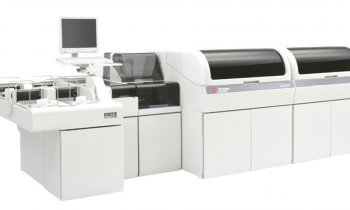Simpler tests for gastrointestinal cancers
Colorectal cancer occurs in approximately one in every 17 people during their lifetime and is the second leading cause of cancer death in Europe. Two new blood tests could aid in the early identification of patients with gastrointestinal (GI) cancers. The tests will make GI cancer detection simpler, cost-effective, and more acceptable to patients than current methods, the researchers say.

In the first study, Dr Joost Louwagie, from the company OncoMethylome Sciences, headquartered in Liège, Belgium, presents data on the way in which tumour markers for colorectal cancer were selected, the analytical performance of the test and the first results from a multi-centre feasibility study. “This test has potential to provide a better balance of performance, cost-effectiveness and patient compliance than other options currently available for colorectal cancer screening,” he says.
The scientists collected blood before surgery from 193 patients known to have colorectal cancer, as well as from 688 controls undergoing colonoscopy for cancer screening. DNA was extracted from the blood plasma and tested for the presence of DNA methylation of specific genes. DNA methylation is involved in the regulation of protein expression, and methylation or silencing of key genes has been linked to the initiation and progression of tumours. Based on studies conducted in colorectal tissues, methylated genes that were capable of discriminating accurately between cancerous and normal tissues were chosen. The scientists then evaluated the best-performing methylated genes in blood samples, with the ultimate goal of providing a sensitive, specific and patient-friendly option for colorectal cancer screening.
“We optimised the methods of DNA extraction and methylation detection so that we could detect low levels of methylated genes in people with colorectal cancer,” says Dr Louwagie, “and we were able to find a high frequency of two newly reported methylation genes, SYNE1 and FOXE1, in colorectal cancer patients. The same methylation genes occurred infrequently in non-cancerous individuals.”
When testing a first set of 444 controls and 124 colorectal cancer patients, with plasma volumes ranging between 0.8 and 4.3 ml, the sensitivity and specificity for the combination of SYNE1 and FOXE1 was 58% and 90% respectively. Testing this marker combination in a second, independent group of 242 controls and 69 cases, the sensitivity (proportion of positives correctly identified) and specificity (proportion of negatives correctly identified) were 56% and 91% respectively (77% and 91% in the samples with at least 3.3 ml of plasma). The sensitivity for stage I and II disease was 41% and 80% respectively.
Colonoscopy, where the interior of the colon and rectum is examined using a tiny camera mounted on a flexible tube, is the most sensitive test currently available and has the benefit of allowing removal of pre-cancerous polyps. Colonoscopy, however, is invasive, expensive, requires bowel preparation and skilled practitioners, making it inaccessible or unacceptable for many patients.
Faecal occult blood testing (FOBT), where patients give stool samples to be analysed, is less invasive, inexpensive and is used in national screening programmes in some European countries. However, due to patients’ reluctance to handle stool samples, compliance for even the best-organised national screening programs is often less than 50%.
“Once validated in a prospective colorectal screening trial, the new methylation test could be used as a non-invasive screening option for patients who decline or do not have access to colonoscopy or do not wish to undertake the faecal occult blood test,” says Dr Louwagie. “The blood sample can be taken by nurses or primary care doctors without the need for special equipment or training, leading to higher rates of patient compliance and the identification of patients needing the more expensive and diagnostic colonoscopy procedure. Giving such a blood sample could become part of the regular physical examination undertaken as part of a health insurance package in many countries.”
The scientists are currently enrolling people into a prospective colorectal screening study in several German colonoscopy centres. “We plan to complete enrollment of 7000 people by the end of 2009,” says Dr Louwagie “and are currently talking to several partners about distribution rights. This new test will not replace colonoscopy, but provide a way of screening a larger part of the population in a more patient-friendly and non-invasive manner so that more cancers are detected and treated successfully.”
In a different study, researchers from Germany will say that they have developed another blood test that helps diagnose tumours in patients with colon, rectal, or gastric cancers. Professor Ulrike Stein, from the ECRC Charité University of Medicine, and the Max-Delbrueck-Centre for Molecular Medicine, both based in Berlin, says that the test can also predict the likelihood of metastatic disease in patients after diagnosis of these cancers.
Prof Stein and her team looked for the existence of an S100A4 transcript [2], by isolating RNA from blood plasma samples from patient with GI tumours. They collected daily blood samples from hospitalised and outpatients; 185 samples for colon cancer, 190 for rectal, and 91 for gastric cancer patients. They also analysed the blood of 51 age-matched, tumour-free volunteers.
“We found that S100A4 mRNA was present at significantly higher levels in the group of cancer patients, no matter whether they had colorectal or gastric cancer, than in the tumour-free control group,” says Prof Stein, “and there were yet higher levels in the patients with metastases than in those where the disease had not yet metastasised. More importantly, prospective analysis of the data showed that follow-up patients who later developed metastases showed higher S100A4 levels at initial blood analysis than those whose disease did not metastasise. This means that in future we might be able to identify those patients who are likely to develop metastases.”
Because the new test could be useful in identifying tumours in patients showing no signs of disease, it could be an effective tool in population screening for GI cancers. This needs to be tested in a large prospective trial, the researchers say. The S100A4 transcript was already known to promote the increased metastatic capability of cancer cells, but the problem to date has been that tests to establish its existence in a tumour have been expensive and complicated.
The scientists now intend to look at the correlation of S100A4 transcript levels in blood and the survival of individual patients after a minimum of three years follow-up. “We are hoping that, by enabling the identification of those patients whose disease is likely to progress more quickly, we will be able to treat them in the future accordingly by tailoring therapy to their individual needs,” says Prof Stein.
Picture: OncoMethylome Sciences
23.09.2009











